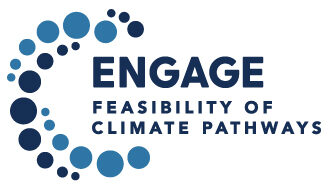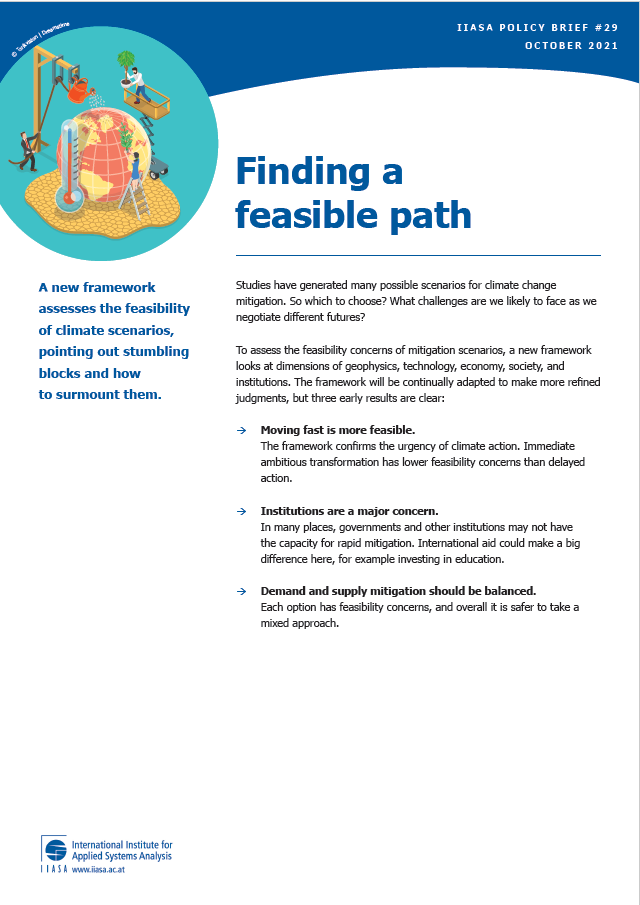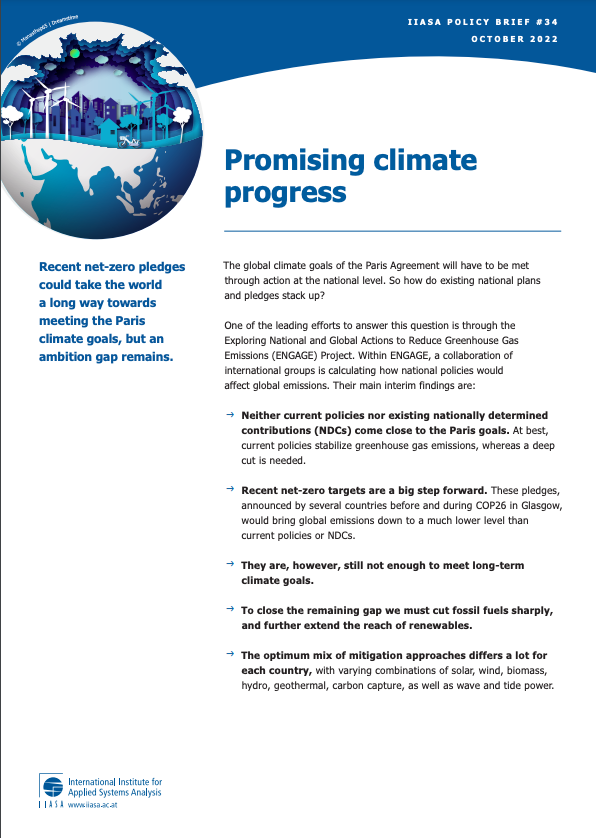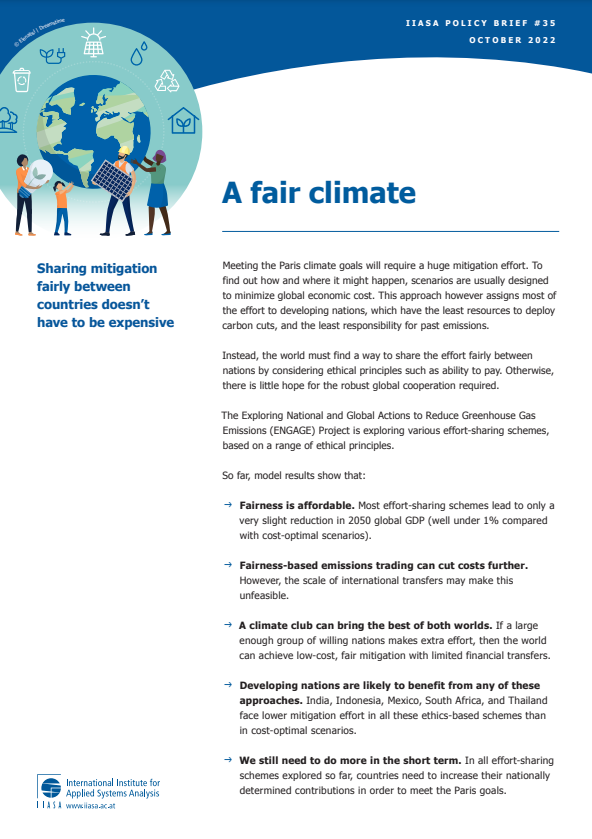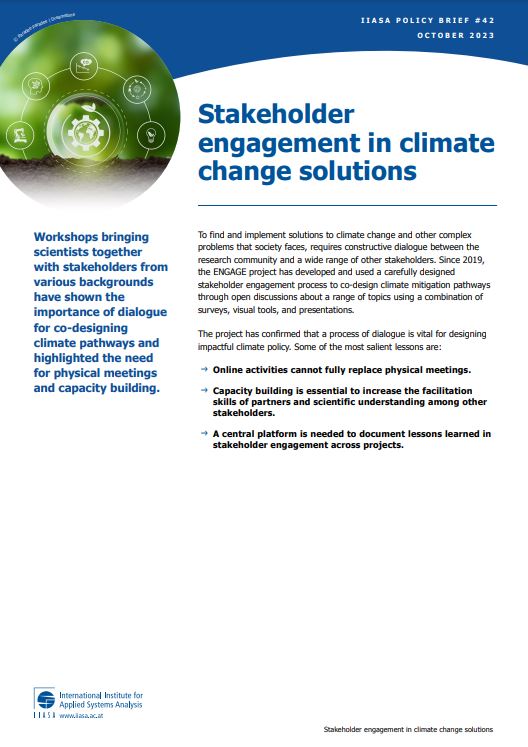Publications
The ENGAGE project regularly communicates and disseminates its innovative results through continuous publications in scientific journals. This knowledge base serves as a public resource for direct access to these articles.
ENGAGE Policy Briefs



Publications
2024
Müller-Casseres, E., Leblanc, F., Van Den Berg, M., Fragkos, P., Dessens, O., Naghash, H., Draeger, R., Le Gallic, T., Tagomori, I. S., Tsiropoulos, I., Emmerling, J., Baptista, L. B., Van Vuuren, D. P., Giannousakis, A., Drouet, L., Portugal-Pereira, J., De Boer, H.-S., Tsanakas, N., Rochedo, P. R. R., … Schaeffer, R. (2024). International shipping in a world below 2 °C. Nature Climate Change, 14(6), 600–607. https://doi.org/10.1038/s41558-024-01997-1
An integrated perspective on the decarbonization of shipping. (2024). Nature Climate Change, 14(6), 557–558. https://doi.org/10.1038/s41558-024-02010-5
2023
Bertram, C., Brutschin, E., Riahi, K., van Ruijven, B., & Battersby, S. (2023). Feasible futures [IIASA Policy Brief]. PB-41. https://pure.iiasa.ac.at/id/eprint/19114/
Den Elzen, M. G. J., Dafnomilis, I., Hof, A. F., Olsson, M., Beusen, A., Botzen, W. J. W., Kuramochi, T., Nascimento, L., & Rogelj, J. (2023). The impact of policy and model uncertainties on emissions projections of the Paris Agreement pledges. Environmental Research Letters, 18(5), 054026. https://doi.org/10.1088/1748-9326/acceb7
Brutschin, E. (2023). A new hope for nuclear? In D. Scholten (Ed.), Handbook on the Geopolitics of the Energy Transition (pp. 372–386). Edward Elgar Publishing. https://doi.org/10.4337/9781800370432.00027
Dekker, M. M., Daioglou, V., Pietzcker, R., Rodrigues, R., de Boer, H.-S., Dalla Longa, F., Drouet, L., Emmerling, J., Fattahi, A., Fotiou, T., Fragkos, P., Fricko, O., Gusheva, E., Harmsen, M., Huppmann, D., Kannavou, M., Krey, V., Lombardi, F., Luderer, G., … van Vuuren, D. (2023). Identifying energy model fingerprints in mitigation scenarios. Nature Energy. https://doi.org/doi:10.1038/s41560-023-01399-1
Fiorini, A. C. O., Angelkorte, G., Maia, P. L., Bergman-Fonte, C., Vicente, C., Morais, T., Carvalho, L., Zanon-Zotin, M., Szklo, A., Schaeffer, R., & Portugal-Pereira, J. (2023). Sustainable aviation fuels must control induced land use change: an integrated assessment modelling exercise for Brazil. Environmental Research Letters, 18(1), 014036. https://doi.org/10.1088/1748-9326/acaee1
Hyun, M., Cherp, A., Jewell, J., Kim, Y. J., & Eom, J. (2023). Feasibility trade-offs in decarbonising the power sector with high coal dependence: The case of Korea. Renewable and Sustainable Energy Transition, 3, 100050. https://doi.org/10.1016/j.rset.2023.100050
Jäger, J., Battersby, S., & van Ruijven, B. (2023). Stakeholder engagement in climate change solutions [IIASA Policy Brief]. PB-42. https://pure.iiasa.ac.at/id/eprint/19113/
Jäger, J., Brutschin, E., Pianta, S., Omann, I., Kammerlander, M., Sudharmma Vishwanathan, S., Vrontisi, Z., MacDonald, J., & Van Ruijven, B. (2023). Stakeholder engagement and decarbonization pathways: Meeting the challenges of the COVID-19 pandemic. Frontiers in Sustainability, 3, 1063719. https://doi.org/10.3389/frsus.2022.1063719
Jakhmola, A., Jewell, J., Vinichenko, V., & Cherp, A. (2023). Projecting Feasible Medium-Term Growth of Wind and Solar Power Using National Trajectories and Hindcasting [Preprint]. SSRN. https://doi.org/10.2139/ssrn.4501704
Jewell, J., & Cherp, A. (2023). The feasibility of climate action: Bridging the inside and the outside view through feasibility spaces. WIREs Climate Change, 14(5), e838. https://doi.org/10.1002/wcc.838
Lægreid, O. M., Cherp, A., & Jewell, J. (2023). Coal phase-out pledges follow peak coal: evidence from 60 years of growth and decline in coal power capacity worldwide. Oxford Open Energy, 2, oiad009. https://doi.org/10.1093/ooenergy/oiad009
Lamboll, R. D., Nicholls, Z. R. J., Smith, C. J., Kikstra, J. S., Byers, E., & Rogelj, J. (2023). Assessing the size and uncertainty of remaining carbon budgets. Nature Climate Change. https://doi.org/doi:10.1038/s41558-023-01848-5
Limmeechokchai, B., Rajbhandari, S., Pradhan, B. B., Chunark, P., Chaichaloempreecha, A., Fujimori, S., Oshiro, K., & Ochi, Y. (2023). Scaling up climate ambition post-2030: a long-term GHG mitigation analysis for Thailand. Climate Policy, 23(2), 168–183. https://doi.org/10.1080/14693062.2022.2126813
Oliveira Fiorini, A. C., Rua Rodriguez Rochedo, P., Angelkorte, G., Diuana, F. A., Império, M., Silva Carvalho, L., Nogueira Morais, T., Vasquez-Arroyo, E., & Schaeffer, R. (2023). Investigating biodiversity trends in different mitigation scenarios with a national integrated assessment model. Journal of Integrative Environmental Sciences, 20(1), 2239323. https://doi.org/10.1080/1943815X.2023.2239323
Ren, M., Huang, C., Wu, Y., Deppermann, A., Frank, S., Havlík, P., Zhu, Y., Fang, C., Ma, X., Liu, Y., Zhao, H., Chang, J., Ma, L., Bai, Z., Xu, S., & Dai, H. (2023). Enhanced food system efficiency is the key to China’s 2060 carbon neutrality target. Nature Food, 4(7), 552–564. https://doi.org/10.1038/s43016-023-00790-1
Suzuki, M., Jewell, J., & Cherp, A. (2023). Have climate policies accelerated energy transitions? Historical evolution of electricity mix in the G7 and the EU compared to net-zero targets. Energy Research & Social Science, 106, e103281. https://doi.org/doi:10.1016/j.erss.2023.103281
Pianta, S., & Brutschin, E. (2023). Increased ambition is needed after Glasgow. Nature Climate Change, 13(6), 505–506. https://doi.org/10.1038/s41558-023-01676-7
van Ruijven, B., Jäger, J., Riahi, K., Battersby, S., Bertram, C., Bosetti, V., Brutschin, E., Byers, E., Cherp, A., Drouet, L., Fujimori, S., Krey, V., Schaeffer, R., Schmidt Tagomori, I., van Vuuren, D., Vrontisi, Z., & ENGAGE Consortium. (2023). ENGAGE Summary for Policymakers [IIASA Policy Brief]. https://pure.iiasa.ac.at/id/eprint/19116/
Vinichenko, V., Jewell, J., Jacobsson, J., & Cherp, A. (2023). Historical diffusion of nuclear, wind and solar power in different national contexts: implications for climate mitigation pathways. Environmental Research Letters, 18(9), 094066. https://doi.org/10.1088/1748-9326/acf47a
Vinichenko, V., Vetier, M., Jewell, J., Nacke, L., & Cherp, A. (2023a). Phasing out coal for 2 °C target requires worldwide replication of most ambitious national plans despite security and fairness concerns. Environmental Research Letters, 18(1), 014031. https://doi.org/10.1088/1748-9326/acadf6
Zanon-Zotin, M., Bergman-Fonte, C., Nogueira Morais, T., Barbosa Maia, P. L., Carvalho, L., Angelkorte, G., Oliveira Fiorini, A. C., Rua Rodriguez Rochedo, P., Portugal-Pereira, J., Szklo, A., & Schaeffer, R. (2023). Unpacking bio-based alternatives to ethylene production in Brazil, Europe, and the United States: A comparative life cycle assessment. Journal of Cleaner Production, 428, 139376. https://doi.org/10.1016/j.jclepro.2023.139376
2022
Brutschin, E., & Andrijevic, M. (2022). Why Ambitious and Just Climate Mitigation Needs Political Science. Politics and Governance, 10(3), 167–170. https://doi.org/10.17645/pag.v10i3.6156
Brutschin, E., Schenuit, F., Van Ruijven, B., & Riahi, K. (2022). Exploring Enablers for an Ambitious Coal Phaseout. Politics and Governance, 10(3), 200–212. https://doi.org/10.17645/pag.v10i3.5535
Dafnomilis, I., Chen, H.-H., Den Elzen, M., Fragkos, P., Chewpreecha, U., Van Soest, H., Fragkiadakis, K., Karkatsoulis, P., Paroussos, L., De Boer, H.-S., Daioglou, V., Edelenbosch, O., Kiss-Dobronyi, B., & Van Vuuren, D. P. (2022). Targeted Green Recovery Measures in a Post-COVID-19 World Enable the Energy Transition. Frontiers in Climate, 4, 840933. https://doi.org/10.3389/fclim.2022.840933
Den Elzen, M. G. J., Dafnomilis, I., Forsell, N., Fragkos, P., Fragkiadakis, K., Höhne, N., Kuramochi, T., Nascimento, L., Roelfsema, M., Van Soest, H., & Sperling, F. (2022). Updated nationally determined contributions collectively raise ambition levels but need strengthening further to keep Paris goals within reach. Mitigation and Adaptation Strategies for Global Change, 27(5), 33. https://doi.org/10.1007/s11027-022-10008-7
Franz, S., Rottoli, M., & Bertram, C. (2022). The wide range of possible aviation demand futures after the COVID-19 pandemic. Environmental Research Letters, 17(6), 064009. https://doi.org/10.1088/1748-9326/ac65a4
Humpenöder, F., Bodirsky, B. L., Weindl, I., Lotze-Campen, H., Linder, T., & Popp, A. (2022). Projected environmental benefits of replacing beef with microbial protein. Nature, 605(7908), 90–96. https://doi.org/10.1038/s41586-022-04629-w
Fujimori, S., Wu, W., Doelman, J., Frank, S., Hristov, J., Kyle, P., Sands, R., Van Zeist, W.-J., Havlik, P., Domínguez, I. P., Sahoo, A., Stehfest, E., Tabeau, A., Valin, H., Van Meijl, H., Hasegawa, T., & Takahashi, K. (2022). Land-based climate change mitigation measures can affect agricultural markets and food security. Nature Food, 3(2), 110–121. https://doi.org/10.1038/s43016-022-00464-4
Hans, F., Woollands, S., Nascimento, L., Höhne, N., & Kuramochi, T. (2022). Unpacking the COVID-19 rescue and recovery spending: an assessment of implications on greenhouse gas emissions towards 2030 for key emitters. Climate Action, 1(1), 3. https://doi.org/10.1007/s44168-022-00002-9
Hickmann, T., Bertram, C., Biermann, F., Brutschin, E., Kriegler, E., Livingston, J. E., Pianta, S., Riahi, K., Van Ruijven, B., & Van Vuuren, D. (2022). Exploring Global Climate Policy Futures and Their Representation in Integrated Assessment Models. Politics and Governance, 10(3), 171–185. https://doi.org/10.17645/pag.v10i3.5328
Huppmann, D., & Hackstock, P. (2022, February). The Python package pyam for analysis, validation & visualization of integrated-assessment and energy-systems scenarios. ENGAGE Capacity Building Workshop on Good Practices. https://pure.iiasa.ac.at/id/eprint/17783/
Kikstra, J. S., Nicholls, Z. R. J., Smith, C. J., Lewis, J., Lamboll, R. D., Byers, E., Sandstad, M., Meinshausen, M., Gidden, M. J., Rogelj, J., Kriegler, E., Peters, G. P., Fuglestvedt, J. S., Skeie, R. B., Samset, B. H., Wienpahl, L., Van Vuuren, D. P., Van Der Wijst, K.-I., Al Khourdajie, A., … Riahi, K. (2022). The IPCC Sixth Assessment Report WGIII climate assessment of mitigation pathways: from emissions to global temperatures. Geoscientific Model Development, 15(24), 9075–9109. https://doi.org/10.5194/gmd-15-9075-2022
Limmeechokchai, B., Bahadur Pradhan, B., Chunark, P., Chaichaloempreecha, A., Rajbhandari, S., & Pita, P. (2022). Energy system transformation for attainability of net zero emissions in Thailand. International Journal of Sustainable Energy Planning and Management, 35, 27–44. https://doi.org/10.54337/ijsepm.7116
Müller-Casseres, E., Szklo, A., Fonte, C., Carvalho, F., Portugal-Pereira, J., Baptista, L. B., Maia, P., Rochedo, P. R. R., Draeger, R., & Schaeffer, R. (2022). Are there synergies in the decarbonization of aviation and shipping? An integrated perspective for the case of Brazil. iScience, 25(10), 105248. https://doi.org/10.1016/j.isci.2022.105248
Nacke, L., Cherp, A., & Jewell, J. (2022). Phases of fossil fuel decline: Diagnostic framework for policy sequencing and feasible transition pathways in resource dependent regions. Oxford Open Energy, 1, oiac002. https://doi.org/10.1093/ooenergy/oiac002
Nascimento, L., Kuramochi, T., Iacobuta, G., Den Elzen, M., Fekete, H., Weishaupt, M., Van Soest, H. L., Roelfsema, M., Vivero-Serrano, G. D., Lui, S., Hans, F., Jose De Villafranca Casas, M., & Höhne, N. (2022). Twenty years of climate policy: G20 coverage and gaps. Climate Policy, 22(2), 158–174. https://doi.org/10.1080/14693062.2021.1993776
Nicholls, Z., Meinshausen, M., Lewis, J., Smith, C. J., Forster, P. M., Fuglestvedt, J. S., Rogelj, J., Kikstra, J. S., Riahi, K., & Byers, E. (2022). Changes in IPCC Scenario Assessment Emulators Between SR1.5 and AR6 Unraveled. Geophysical Research Letters, 49(20), e2022GL099788. https://doi.org/10.1029/2022GL099788
Pianta, S., & Brutschin, E. (2022). Emissions Lock-in, Capacity, and Public Opinion: How Insights From Political Science Can Inform Climate Modeling Efforts. Politics and Governance, 10(3), 186–199. https://doi.org/10.17645/pag.v10i3.5462
Reis, L. A., Drouet, L., & Tavoni, M. (2022). Internalising health-economic impacts of air pollution into climate policy: a global modelling study. The Lancet Planetary Health, 6(1), e40–e48. https://doi.org/10.1016/S2542-5196(21)00259-X
Malik, A., & Bertram, C. (2022). Solar energy as an early just transition opportunity for coal-bearing states in India. Environmental Research Letters, 17(3), 034011. https://doi.org/10.1088/1748-9326/ac5194
Roelfsema, M., Van Soest, H. L., Den Elzen, M., De Coninck, H., Kuramochi, T., Harmsen, M., Dafnomilis, I., Höhne, N., & Van Vuuren, D. P. (2022). Developing scenarios in the context of the Paris Agreement and application in the integrated assessment model IMAGE: A framework for bridging the policy-modelling divide. Environmental Science & Policy, 135, 104–116. https://doi.org/10.1016/j.envsci.2022.05.001
Schmidt Tagomori, I., den Elzen, M., van Vuuren, D., Amendola Diuana, F., Schaefer, R., & Battersby, S. (2022). Promising climate progress [IIASA Policy Brief]. PB-34. https://pure.iiasa.ac.at/id/eprint/18378/
Vrontisi, Z., & Fragkiadakis, D. (2022). A fair climate [IIASA Policy Brief]. PB-35. https://pure.iiasa.ac.at/id/eprint/18379/
2021
Avashia, V., Garg, A., & Dholakia, H. (2021). Understanding temperature related health risk in context of urban land use changes. Landscape and Urban Planning, 212, 104107. https://doi.org/10.1016/j.landurbplan.2021.104107
Riahi, K., Bertram, C., Huppmann, D., Rogelj, J., Bosetti, V., Cabardos, A.-M., Deppermann, A., Drouet, L., Frank, S., Fricko, O., Fujimori, S., Harmsen, M., Hasegawa, T., Krey, V., Luderer, G., Paroussos, L., Schaeffer, R., Weitzel, M., Zwaan, B. V. D., … Zakeri, B. (2021). Long-term economic benefits of stabilizing warming without overshoot – the ENGAGE model intercomparison [Preprint]. In Review. https://doi.org/10.21203/rs.3.rs-127847/v1
Battiston, S., Monasterolo, I., Riahi, K., & Van Ruijven, B. J. (2021). Accounting for finance is key for climate mitigation pathways. Science, 372(6545), 918–920. https://doi.org/10.1126/science.abf3877
Baumstark, L., Bauer, N., Benke, F., Bertram, C., Bi, S., Gong, C. C., Dietrich, J. P., Dirnaichner, A., Giannousakis, A., Hilaire, J., Klein, D., Koch, J., Leimbach, M., Levesque, A., Madeddu, S., Malik, A., Merfort, A., Merfort, L., Odenweller, A., … Luderer, G. (2021). REMIND2.1: transformation and innovation dynamics of the energy-economic system within climate and sustainability limits. Geoscientific Model Development, 14(10), 6571–6603. https://doi.org/10.5194/gmd-14-6571-2021
Bertram, C., Luderer, G., Creutzig, F., Bauer, N., Ueckerdt, F., Malik, A., & Edenhofer, O. (2021). COVID-19-induced low power demand and market forces starkly reduce CO2 emissions. Nature Climate Change, 11(3), 193–196. https://doi.org/10.1038/s41558-021-00987-x
Bertram, C., Riahi, K., Hilaire, J., Bosetti, V., Drouet, L., Fricko, O., Malik, A., Nogueira, L. P., Van Der Zwaan, B., Van Ruijven, B., Van Vuuren, D., Weitzel, M., Longa, F. D., De Boer, H.-S., Emmerling, J., Fosse, F., Fragkiadakis, K., Harmsen, M., Keramidas, K., … Luderer, G. (2021). Energy system developments and investments in the decisive decade for the Paris Agreement goals. Environmental Research Letters, 16(7), 074020. https://doi.org/10.1088/1748-9326/ac09ae
Brutschin, E., & Battersby, S. (2021). Finding a feasible path [IIASA Policy Brief]. PB-29. https://pure.iiasa.ac.at/id/eprint/17605/
Brutschin, E., Cherp, A., & Jewell, J. (2021). Failing the formative phase: The global diffusion of nuclear power is limited by national markets. Energy Research & Social Science, 80, 102221. https://doi.org/10.1016/j.erss.2021.102221
Brutschin, E., Pianta, S., Tavoni, M., Riahi, K., Bosetti, V., Marangoni, G., & Van Ruijven, B. J. (2021). A multidimensional feasibility evaluation of low-carbon scenarios. Environmental Research Letters, 16(6), 064069. https://doi.org/10.1088/1748-9326/abf0ce
Cherp, A. (2021). Cost of non-uniform climate policies. Nature Climate Change, 11(9), 722–723. https://doi.org/10.1038/s41558-021-01133-3
Cherp, A., Vinichenko, V., Tosun, J., Gordon, J. A., & Jewell, J. (2021). National growth dynamics of wind and solar power compared to the growth required for global climate targets. Nature Energy, 6(7), 742–754. https://doi.org/10.1038/s41560-021-00863-0
Dimitrova, A., Marois, G., Kiesewetter, G., K C, S., Rafaj, P., & Tonne, C. (2021). Health impacts of fine particles under climate change mitigation, air quality control, and demographic change in India. Environmental Research Letters, 16(5), 054025. https://doi.org/10.1088/1748-9326/abe5d5
Drouet, L., Bosetti, V., Padoan, S. A., Aleluia Reis, L., Bertram, C., Dalla Longa, F., Després, J., Emmerling, J., Fosse, F., Fragkiadakis, K., Frank, S., Fricko, O., Fujimori, S., Harmsen, M., Krey, V., Oshiro, K., Nogueira, L. P., Paroussos, L., Piontek, F., … Tavoni, M. (2021). Net zero-emission pathways reduce the physical and economic risks of climate change. Nature Climate Change, 11(12), 1070–1076. https://doi.org/10.1038/s41558-021-01218-z
European Commission. (2021). Climate Action in the Post-COVID-19 world: Insights from EU-funded projects on how to build forward better. In Climate Action in the post-COVID-19 world-Insights from EU-funded projects on how to build forward better. European Commission. https://doi.org/10.2777/02755
Fekete, H., Kuramochi, T., Roelfsema, M., Elzen, M. D., Forsell, N., Höhne, N., Luna, L., Hans, F., Sterl, S., Olivier, J., Van Soest, H., Frank, S., & Gusti, M. (2021). A review of successful climate change mitigation policies in major emitting economies and the potential of global replication. Renewable and Sustainable Energy Reviews, 137, 110602. https://doi.org/10.1016/j.rser.2020.110602
Frank, S., Gusti, M., Havlík, P., Lauri, P., DiFulvio, F., Forsell, N., Hasegawa, T., Krisztin, T., Palazzo, A., & Valin, H. (2021). Land-based climate change mitigation potentials within the agenda for sustainable development. Environmental Research Letters, 16(2), 024006. https://doi.org/10.1088/1748-9326/abc58a
Frank, S., Havlík, P., Tabeau, A., Witzke, P., Boere, E., Bogonos, M., Deppermann, A., Van Dijk, M., Höglund-Isaksson, L., Janssens, C., Kesting, M., Van Meijl, H., Pérez-Domínguez, I., & Valin, H. (2021). How much multilateralism do we need? Effectiveness of unilateral agricultural mitigation efforts in the global context. Environmental Research Letters, 16(10), 104038. https://doi.org/10.1088/1748-9326/ac2967
Fujimori, S. (2021). ENGAGE National database for Nature Climate Change Perspective (Fujimori et al., 2021). Zenodo. https://doi.org/10.5281/zenodo.4653340
Fujimori, S., Krey, V., Van Vuuren, D., Oshiro, K., Sugiyama, M., Chunark, P., Limmeechokchai, B., Mittal, S., Nishiura, O., Park, C., Rajbhandari, S., Silva Herran, D., Tu, T. T., Zhao, S., Ochi, Y., Shukla, P. R., Masui, T., Nguyen, P. V. H., Cabardos, A.-M., & Riahi, K. (2021). A framework for national scenarios with varying emission reductions. Nature Climate Change, 11(6), 472–480. https://doi.org/10.1038/s41558-021-01048-z
Fujimori, S., van Soest, H., & Battersby, S. (2021). United scenarios [IIASA Policy Brief]. PB-31. https://pure.iiasa.ac.at/id/eprint/17607/
Grassi, G., Stehfest, E., Rogelj, J., Van Vuuren, D., Cescatti, A., House, J., Nabuurs, G.-J., Rossi, S., Alkama, R., Viñas, R. A., Calvin, K., Ceccherini, G., Federici, S., Fujimori, S., Gusti, M., Hasegawa, T., Havlik, P., Humpenöder, F., Korosuo, A., … Popp, A. (2021). Critical adjustment of land mitigation pathways for assessing countries’ climate progress. Nature Climate Change, 11(5), 425–434. https://doi.org/10.1038/s41558-021-01033-6
Hasegawa, T., Fujimori, S., Frank, S., Humpenöder, F., Bertram, C., Després, J., Drouet, L., Emmerling, J., Gusti, M., Harmsen, M., Keramidas, K., Ochi, Y., Oshiro, K., Rochedo, P., Van Ruijven, B., Cabardos, A.-M., Deppermann, A., Fosse, F., Havlik, P., … Riahi, K. (2021). Land-based implications of early climate actions without global net-negative emissions. Nature Sustainability, 4(12), 1052–1059. https://doi.org/10.1038/s41893-021-00772-w
Huppmann, D. (2021, June). Das Python-Paket pyam zur Analyse Validierung & Visualisierung von Energiesystem- und Klimaszenarien. Strommarkttreffen-Online Seminar Series. https://doi.org/10.22022/IACC/07-2021.17319
Huppmann, D., Gidden, M. J., Nicholls, Z., Hörsch, J., Lamboll, R., Kishimoto, P. N., Burandt, T., Fricko, O., Byers, E., Kikstra, J., Brinkerink, M., Budzinski, M., Maczek, F., Zwickl-Bernhard, S., Welder, L., Álvarez Quispe, E. F., & Smith, C. J. (2021). pyam: Analysis and visualisation of integrated assessment and macro-energy scenarios. Open Research Europe, 1, 74. https://doi.org/10.12688/openreseurope.13633.1
Kikstra, J. S., Vinca, A., Lovat, F., Boza-Kiss, B., Van Ruijven, B., Wilson, C., Rogelj, J., Zakeri, B., Fricko, O., & Riahi, K. (2021). Climate mitigation scenarios with persistent COVID-19-related energy demand changes. Nature Energy, 6(12), 1114–1123. https://doi.org/10.1038/s41560-021-00904-8
Kikstra, J., Vinca, A., Lovat, F., Boza-Kiss, B., van Ruijven, B., Wilson, C., Rogelj, J., Zakeri, B., Fricko, O., & Riahi, K. (2021). Data for climate mitigation scenarios with persistent COVID-19 related energy demand changes. Zenodo. https://doi.org/10.5281/zenodo.5211168
Köberle, A. C., Vandyck, T., Guivarch, C., Macaluso, N., Bosetti, V., Gambhir, A., Tavoni, M., & Rogelj, J. (2021). The cost of mitigation revisited. Nature Climate Change, 11, 1035–1045. https://doi.org/10.1038/s41558-021-01203-6
Kuramochi, T., Nascimento, L., Moisio, M., Den Elzen, M., Forsell, N., Van Soest, H., Tanguy, P., Gonzales, S., Hans, F., Jeffery, M. L., Fekete, H., Schiefer, T., De Villafranca Casas, M. J., De Vivero-Serrano, G., Dafnomilis, I., Roelfsema, M., & Höhne, N. (2021). Greenhouse gas emission scenarios in nine key non-G20 countries: An assessment of progress toward 2030 climate targets. Environmental Science & Policy, 123, 67–81. https://doi.org/10.1016/j.envsci.2021.04.015
Luderer, G., Madeddu, S., Merfort, L., Ueckerdt, F., Pehl, M., Pietzcker, R., Rottoli, M., Schreyer, F., Bauer, N., Baumstark, L., Bertram, C., Dirnaichner, A., Humpenöder, F., Levesque, A., Popp, A., Rodrigues, R., Strefler, J., & Kriegler, E. (2021). Impact of declining renewable energy costs on electrification in low-emission scenarios. Nature Energy, 7(1), 32–42. https://doi.org/10.1038/s41560-021-00937-z
Lui, S., Kuramochi, T., Smit, S., Roelfsema, M., Hsu, A., Weinfurter, A., Chan, S., Hale, T., Fekete, H., Lütkehermöller, K., Jose De Villafranca Casas, M., Nascimento, L., Sterl, S., & Höhne, N. (2021). Correcting course: the emission reduction potential of international cooperative initiatives. Climate Policy, 21(2), 232–250. https://doi.org/10.1080/14693062.2020.1806021
Malik, A., Bertram, C., Kriegler, E., & Luderer, G. (2021). Climate policy accelerates structural changes in energy employment. Energy Policy, 159, 112642. https://doi.org/10.1016/j.enpol.2021.112642
Martin, M. A., Sendra, O. A., Bastos, A., Bauer, N., Bertram, C., Blenckner, T., Bowen, K., Brando, P. M., Rudolph, T. B., Büchs, M., Bustamante, M., Chen, D., Cleugh, H., Dasgupta, P., Denton, F., Donges, J. F., Donkor, F. K., Duan, H., Duarte, C. M., … Woodcock, J. (2021). Ten new insights in climate science 2021: a horizon scan. Global Sustainability, 4, e25. https://doi.org/10.1017/sus.2021.25
Pai, S., Emmerling, J., Drouet, L., Zerriffi, H., & Jewell, J. (2021). Meeting well-below 2°C target would increase energy sector jobs globally. One Earth, 4(7), 1026–1036. https://doi.org/10.1016/j.oneear.2021.06.005
Pianta, S., Brutschin, E., Van Ruijven, B., & Bosetti, V. (2021). Faster or slower decarbonization? Policymaker and stakeholder expectations on the effect of the COVID-19 pandemic on the global energy transition. Energy Research & Social Science, 76, 102025. https://doi.org/10.1016/j.erss.2021.102025
Rafaj, P., Kiesewetter, G., Krey, V., Schoepp, W., Bertram, C., Drouet, L., Fricko, O., Fujimori, S., Harmsen, M., Hilaire, J., Huppmann, D., Klimont, Z., Kolp, P., Aleluia Reis, L., & Van Vuuren, D. (2021). Air quality and health implications of 1.5 °C–2 °C climate pathways under considerations of ageing population: a multi-model scenario analysis. Environmental Research Letters, 16(4), 045005. https://doi.org/10.1088/1748-9326/abdf0b
Riahi, K., Bertram, C., Huppmann, D., Rogelj, J., Bosetti, V., Cabardos, A.-M., Deppermann, A., Drouet, L., Frank, S., Fricko, O., Fujimori, S., Harmsen, M., Hasegawa, T., Krey, V., Luderer, G., Paroussos, L., Schaeffer, R., Weitzel, M., Van Der Zwaan, B., … Zakeri, B. (2021). Cost and attainability of meeting stringent climate targets without overshoot. Nature Climate Change, 11(12), 1063–1069. https://doi.org/10.1038/s41558-021-01215-2
Riahi, K., van Ruijven, B., & Battersby, S. (2021). Avoiding overshoot: why and how [IIASA Policy Brief]. PB-30. https://pure.iiasa.ac.at/id/eprint/17682/
Roe, S., Streck, C., Beach, R., Busch, J., Chapman, M., Daioglou, V., Deppermann, A., Doelman, J., Emmet‐Booth, J., Engelmann, J., Fricko, O., Frischmann, C., Funk, J., Grassi, G., Griscom, B., Havlik, P., Hanssen, S., Humpenöder, F., Landholm, D., … Lawrence, D. (2021). Land‐based measures to mitigate climate change: Potential and feasibility by country. Global Change Biology, 27(23), 6025–6058. https://doi.org/10.1111/gcb.15873
Schultes, A., Piontek, F., Soergel, B., Rogelj, J., Baumstark, L., Kriegler, E., Edenhofer, O., & Luderer, G. (2021). Economic damages from on-going climate change imply deeper near-term emission cuts. Environmental Research Letters, 16(10), e104053. https://doi.org/10.1088/1748-9326/ac27ce
Silva Herran, D., & Fujimori, S. (2021). Beyond Japanese NDC: energy and macroeconomic transitions towards 2050 in emission pathways with multiple ambition levels. Sustainability Science. https://doi.org/10.1007/s11625-021-00930-1
Soergel, B., Kriegler, E., Weindl, I., Rauner, S., Dirnaichner, A., Ruhe, C., Hofmann, M., Bauer, N., Bertram, C., Bodirsky, B. L., Leimbach, M., Leininger, J., Levesque, A., Luderer, G., Pehl, M., Wingens, C., Baumstark, L., Beier, F., Dietrich, J. P., … Popp, A. (2021). A sustainable development pathway for climate action within the UN 2030 Agenda. Nature Climate Change, 11(8), 656–664. https://doi.org/10.1038/s41558-021-01098-3
Van Soest, H. L., Den Elzen, M. G. J., & Van Vuuren, D. P. (2021). Net-zero emission targets for major emitting countries consistent with the Paris Agreement. Nature Communications, 12(1), 2140. https://doi.org/10.1038/s41467-021-22294-x
Vinichenko, V., Cherp, A., & Jewell, J. (2021). Historical precedents and feasibility of rapid coal and gas decline required for the 1.5°C target. One Earth, 4(10), 1477–1490. https://doi.org/10.1016/j.oneear.2021.09.012
Granella, F., Aleluia Reis, L., Bosetti, V., & Tavoni, M. (2021). COVID-19 lockdown only partially alleviates health impacts of air pollution in Northern Italy. Environmental Research Letters, 16(3), 035012. https://doi.org/10.1088/1748-9326/abd3d2
Vishwanathan, S. S., Garg, A., Tiwari, V., Kapshe, M., & Nag, T. (2021). SDG implications of water-energy system transitions in India, for NDC, 2 °C, and well below 2 °C scenarios. Environmental Research Letters, 16(8), 085011. https://doi.org/10.1088/1748-9326/ac08bf
Pihl, E., Alfredsson, E., Bengtsson, M., Bowen, K. J., Cástan Broto, V., Chou, K. T., Cleugh, H., Ebi, K., Edwards, C. M., Fisher, E., Friedlingstein, P., Godoy-Faúndez, A., Gupta, M., Harrington, A. R., Hayes, K., Hayward, B. M., Hebden, S. R., Hickmann, T., Hugelius, G., … Zelinka, M. D. (2021). Ten new insights in climate science 2020 – a horizon scan. Global Sustainability, 4, e5. https://doi.org/10.1017/sus.2021.2
2020
Dubash, N. K. (2020). Revisiting climate ambition: The case for prioritizing current action over future intent. WIREs Climate Change, 11(1), e622. https://doi.org/10.1002/wcc.622
Humpenöder, F., Karstens, K., Lotze-Campen, H., Leifeld, J., Menichetti, L., Barthelmes, A., & Popp, A. (2020). Peatland protection and restoration are key for climate change mitigation. Environmental Research Letters, 15(10), 104093. https://doi.org/10.1088/1748-9326/abae2a
Hurtt, G. C., Chini, L., Sahajpal, R., Frolking, S., Bodirsky, B. L., Calvin, K., Doelman, J. C., Fisk, J., Fujimori, S., Klein Goldewijk, K., Hasegawa, T., Havlik, P., Heinimann, A., Humpenöder, F., Jungclaus, J., Kaplan, J. O., Kennedy, J., Krisztin, T., Lawrence, D., … Zhang, X. (2020). Harmonization of global land use change and management for the period 850–2100 (LUH2) for CMIP6. Geoscientific Model Development, 13(11), 5425–5464. https://doi.org/10.5194/gmd-13-5425-2020
Jewell, J., & Cherp, A. (2020). On the political feasibility of climate change mitigation pathways: Is it too late to keep warming below 1.5°C? WIREs Climate Change, 11(1), e621. https://doi.org/10.1002/wcc.621
Kuramochi, T., Roelfsema, M., Hsu, A., Lui, S., Weinfurter, A., Chan, S., Hale, T., Clapper, A., Chang, A., & Höhne, N. (2020). Beyond national climate action: the impact of region, city, and business commitments on global greenhouse gas emissions. Climate Policy, 20(3), 275–291. https://doi.org/10.1080/14693062.2020.1740150
Leclère, D., Obersteiner, M., Barrett, M., Butchart, S. H. M., Chaudhary, A., De Palma, A., DeClerck, F. A. J., Di Marco, M., Doelman, J. C., Dürauer, M., Freeman, R., Harfoot, M., Hasegawa, T., Hellweg, S., Hilbers, J. P., Hill, S. L. L., Humpenöder, F., Jennings, N., Krisztin, T., … Young, L. (2020). Bending the curve of terrestrial biodiversity needs an integrated strategy. Nature, 585(7826), 551–556. https://doi.org/10.1038/s41586-020-2705-y
Mathur, R., & Shekhar, S. (2020). India’s energy sector choices—options and implications of ambitious mitigation efforts. Climatic Change, 162(4), 1893–1911. https://doi.org/10.1007/s10584-020-02885-1
Yalew, S. G., Van Vliet, M. T. H., Gernaat, D. E. H. J., Ludwig, F., Miara, A., Park, C., Byers, E., De Cian, E., Piontek, F., Iyer, G., Mouratiadou, I., Glynn, J., Hejazi, M., Dessens, O., Rochedo, P., Pietzcker, R., Schaeffer, R., Fujimori, S., Dasgupta, S., … Van Vuuren, D. P. (2020). Impacts of climate change on energy systems in global and regional scenarios. Nature Energy, 5(10), 794–802. https://doi.org/10.1038/s41560-020-0664-z
Miosio, M., van Soest, H., Forsell, N., Nascimento, L., de Vivero, G., Gonzales-Zuñiga, S., Hans, F., Lui, S., Schiefer, T., Mooldijk, S., Höhne, N., Batka, M., Dafnomilis, I., den Elzen, M., & Kuramochi, T. (2020). Overview of recently adopted mitigation policies and climate-relevant policy responses to COVID-19 – 2020 Update. NewClimate Institute, PBL Netherlands Environmental Assessment Agency, International Institute for Applied Systems Analysis. https://newclimate.org/2020/09/29/overview-of-recently-adopted-policies-and-climate-relevant-policy-responses-to-covid-19-2020-update/
O’Neill, B. C., Carter, T. R., Ebi, K., Harrison, P. A., Kemp-Benedict, E., Kok, K., Kriegler, E., Preston, B. L., Riahi, K., Sillmann, J., Van Ruijven, B. J., Van Vuuren, D., Carlisle, D., Conde, C., Fuglestvedt, J., Green, C., Hasegawa, T., Leininger, J., Monteith, S., & Pichs-Madruga, R. (2020). Achievements and needs for the climate change scenario framework. Nature Climate Change, 10(12), 1074–1084. https://doi.org/10.1038/s41558-020-00952-0
Roelfsema, M., Van Soest, H. L., Harmsen, M., Van Vuuren, D. P., Bertram, C., Den Elzen, M., Höhne, N., Iacobuta, G., Krey, V., Kriegler, E., Luderer, G., Riahi, K., Ueckerdt, F., Després, J., Drouet, L., Emmerling, J., Frank, S., Fricko, O., Gidden, M., … Vishwanathan, S. S. (2020). Taking stock of national climate policies to evaluate implementation of the Paris Agreement. Nature Communications, 11(1), 2096. https://doi.org/10.1038/s41467-020-15414-6
Vishwanathan, S. S., & Garg, A. (2020). Energy system transformation to meet NDC, 2 °C, and well below 2 °C targets for India. Climatic Change, 162(4), 1877–1891. https://doi.org/10.1007/s10584-019-02616-1
2019
Fujimori, S., Rogelj, J., Krey, V., & Riahi, K. (2019). A new generation of emissions scenarios should cover blind spots in the carbon budget space. Nature Climate Change, 9(11), 798–800. https://doi.org/10.1038/s41558-019-0611-9
